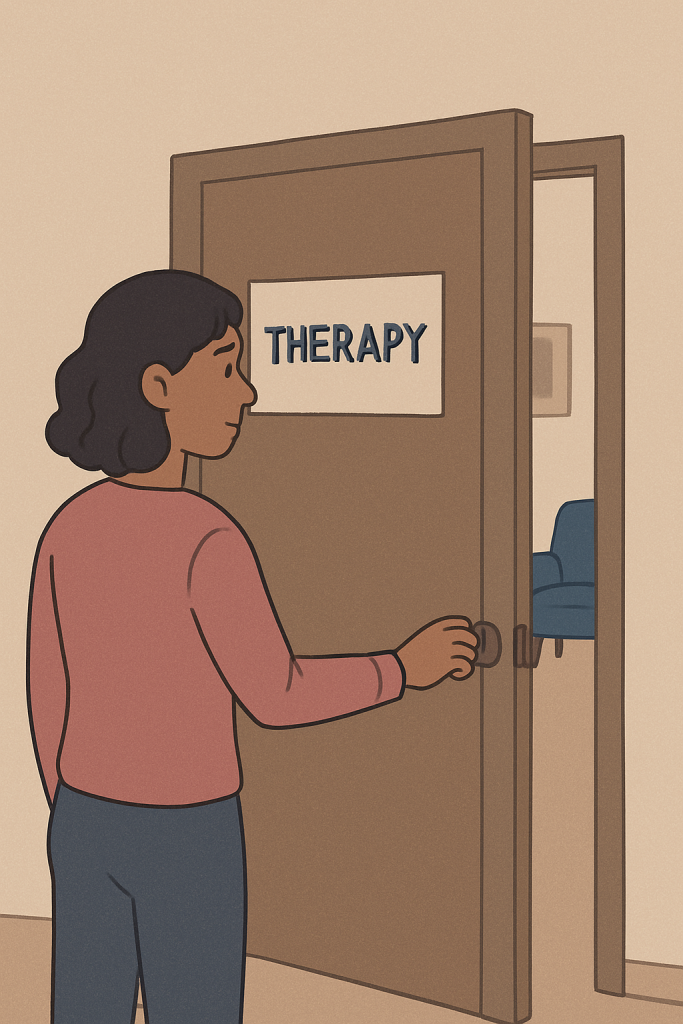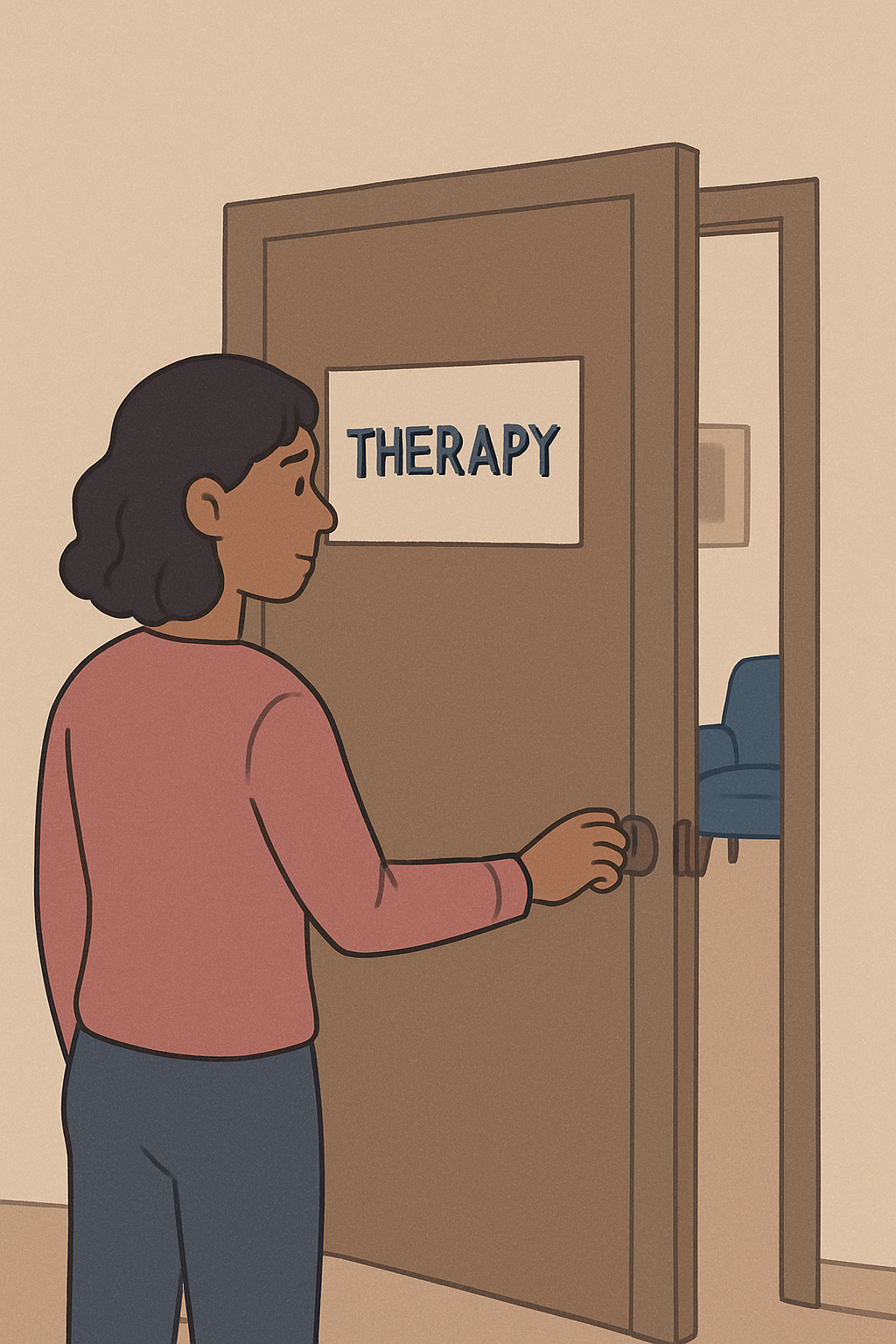There’s a common misconception that therapy is only for people in crisis, or that you need to “hit rock bottom” before reaching out for help. The truth is, therapy can be helpful at many points in life—not just when things feel unbearable.
In fact, some people seek therapy as a proactive choice: to better understand themselves, strengthen relationships, or develop coping skills before life’s challenges grow heavier. Others arrive at therapy because they’ve tried to “handle it on their own” and realize that having support makes all the difference.
No matter where you find yourself, there’s no wrong reason—or wrong time—to begin therapy. If you’ve been wondering whether it may be right for you, here are some signs to consider.
1. You feel stuck in repeating patterns
Do you ever notice yourself falling into the same situations, even when you wish things could be different?
- Choosing partners who don’t meet your needs.
- Struggling with procrastination, even when you want to succeed.
- Getting caught in cycles of people-pleasing and burnout.
Therapy provides a space to explore why these patterns happen and how to begin making choices that align with your values. It’s about breaking free from cycles that no longer serve you.
2. Daily stress feels like too much
Stress is a normal part of being human, but when it starts interfering with your sleep, energy, concentration, or overall health, it may be a sign you need extra support. In therapy, you can:
- Learn practical coping tools.
- Explore the deeper sources of your stress.
- Build resilience so that challenges feel more manageable.
Sometimes, just having a safe space to talk through the day-to-day pressures can lighten the load in powerful ways.
3. Your emotions feel too heavy—or almost absent
Emotions are messages from our inner world. If you notice yourself:
- Feeling persistently sad, anxious, or irritable.
- Struggling to control overwhelming feelings.
- Or, on the other hand, feeling numb or disconnected from yourself…
…therapy can help you reconnect. It’s not about “fixing” your emotions, but learning to listen, regulate, and understand them so they become guides instead of burdens.
4. Relationships feel strained or unfulfilling
Many people come to therapy because they’re feeling isolated, misunderstood, or stuck in conflict with loved ones. Therapy offers tools to:
- Improve communication and set boundaries.
- Explore attachment patterns from past relationships.
- Build healthier, more supportive connections moving forward.
When relationships begin to feel draining instead of nourishing, therapy can help you shift those dynamics.
5. Life transitions are shaking your sense of stability
Change—even positive change—can feel overwhelming. Big transitions like:
- Starting or ending a relationship.
- Moving, changing jobs, or retiring.
- Grieving a loss.
- Entering a new life stage (becoming a parent, adjusting to an empty nest, etc.).
These shifts can leave you feeling unsteady. Therapy gives you a place to process change, honor your emotions, and discover ways to adapt with resilience.
6. You want to know yourself more deeply
Therapy isn’t only for hard seasons. Many people seek it because they want to:
- Understand themselves better.
- Explore their values, purpose, and identity.
- Cultivate more joy, meaning, and balance in daily life.
This kind of growth work is just as important as healing, and it can set the stage for greater well-being in every area of life.
How to Decide If It’s the Right Time for You
There isn’t a single checklist that determines when someone “should” start therapy. Often, the simplest indicator is this: if you’ve been wondering whether therapy might help, it may already be the right time.
A few questions to ask yourself:
- Am I carrying more than I want to carry alone?
- Do I notice the same struggles showing up again and again?
- Could I benefit from a safe, supportive space to sort through my thoughts and feelings?
If the answer is “yes,” then therapy may be a gift worth giving yourself.
How to Choose the Right Therapist
Finding the right therapist is just as important as deciding to start therapy. A strong, supportive connection can make all the difference in your healing and growth. Here are some tips to guide you:
1. Look for Specialties
Therapists often specialize in areas like anxiety, depression, trauma, grief, or relationships. Choosing someone who works with your specific concerns can help you feel understood and supported.
2. Pay Attention to Fit
The therapeutic relationship matters more than any single technique. After your first session, ask yourself:
- Did I feel safe, heard, and respected?
- Was it easy to talk to them?
- Did their responses and style feel supportive for me?
3. Ask Questions
It’s okay to ask about a therapist’s approach, experience, and philosophy. For example:
- “What is your background and training?”
- “How do you usually help clients with concerns like mine?”
- “What can I expect from the first few sessions?”
4. Trust Your Instincts
Therapy is a partnership. If something doesn’t feel like a good fit, it’s perfectly okay to try a different therapist. The right connection will feel safe, respectful, and collaborative.
Taking That First Step
Reaching out to a therapist can feel intimidating—but it’s also an act of courage. You don’t need to have all the right words or even a clear reason. The first conversation is simply about sharing what’s on your mind and seeing if it feels like a good fit.
Remember: therapy is not a last resort. It’s a powerful tool for healing, growth, and self-discovery.
✨ At Inner Solace Counseling, we provide a warm, nonjudgmental space where you can share your story and begin creating the change you’ve been longing for. Whether you’re facing stress, grief, relationship struggles, or simply seeking growth, we would be honored to walk alongside you.
[Schedule an Appointment Today]
Psychotherapies — National Institute of Mental Health (NIMH) — this page describes what psychotherapy (talk therapy) is, explains many types of therapies, and offers guidance on finding help




Leave a Reply